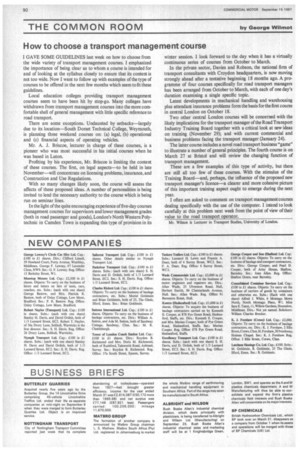THE COMMON ROOM by George Wilmot
Page 92

If you've noticed an error in this article please click here to report it so we can fix it.
How to choose a transport management course
I GAVE SOME GUIDELINES last week on how to choose from the wide variety of transport management courses. I emphasized the importance of being clear as to whom a course is intended for and of looking at the syllabus closely to ensure that its content is not too wide. Now I want to follow up with examples of the type of courses to be offered in the next few months which seem to fit these guidelines.
Local education colleges providing transport management courses seem to have been hit by stop-go. Many colleges have withdrawn from transport management courses into the more comfortable shell of general management with little specific reference to road transport.
There are some exceptions. Undaunted by setbacks—largely due to its location—South Dorset Technical College, Weymouth, is planning three weekend courses on: (a) legal, (b) operational and (c) financial aspects of operating vehicles.
Mr. A. J. Briscoe, lecturer in charge of these courses, is a pioneer who was most successful in his initial courses when he was based in Luton.
Profiting by his experience, Mr. Briscoe is limiting the content of these courses. The first, on legal aspects—to be held in late November—will concentrate on licensing problems, insurance, and Construction and Use Regulations.
With so many changes likely soon, the course will assess the affects of these proposed ideas. A number of personalities is being invited to lend the necessary authority to the course which is being run on seminar lines.
In the light of the quite encouraging experience of five-day courses management courses for supervisors and lower management grades (both in road passenger and goods), London's North Western Polytechnic in Camden Town is expanding this type of provision in its winter session. I look forward to the day when it has a virtually continuous series of courses from October to March.
In the private sector, Davies and Robson, the national firm of transport consultants with Croydon headquarters, is now moving strongly ahead after a tentative beginning 18 months ago. A programme of four courses specifically for road transport managers has been arranged from October to March, with each of one day's duration examining a single specific topic.
Latest developments in mechanical handling and warehousing plus attendant insurance problems form the basis for the first course in central London on October 18.
Two other central London courses will be concerned with the likely implications for the transport manager of the Road Transport Industry Training Board together with a critical look at new ideas on training (November 29); and with current commercial and business problems facing the transport manager (January 24).
The latter course includes a novel road transport business "game" to illustrate a number of general principles. The fourth course is on March 27 at Bristol and will review the changing function of transport management.
These are a few examples of this type of activity, but there are still all too few of these courses. With the stimulus of the Training Board—and, perhaps, the influence of the proposed new transport manager's licence—a clearer and more cohesive picture of this important training aspect ought to emerge during the next year.
I often am asked to comment on transport management courses dealing specifically with the use of the computer. I intend to look carefully at this problem next week from the point of view of their value to the road transport operator.
Mr. Wilmot is Lecturer in Transport Studies, University of London.




































































































































